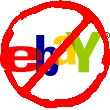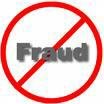Reasons Why Bidders Should Always Use eBay's Ask The Seller a Question ("ASQ") Feature to Contact a Seller
If you haven't noticed, many of the seller listings on eBay provide an email address for contact, and ask bidders NOT to use eBay's Ask the Seller a Question ("ASQ") feature.
In the majority of cases, this request is made by hijackers to bait innocent bidders into unknowingly enter into off eBay transactions. They use excuses that their My eBay mailbox is not accessible, being updated, or full. They even say that they can't access their My eBay mailbox. All of these excuses are lies.
One of the reasons that the hijackers tell you not to use ASQ for contact, is that if you do, you very well may alert the true account holder that his eBay account has been hijacked, because a duplicate copy of the ASQ should go to the account holder's registered email address. But this will only happen, if the true account holder's contact preferences are not turned off. If you can access the Internet and access eBay, then you can access your My eBay mailbox to read messages sent to you by fellow eBay members.
If there is ever any dysfunctionality with any feature not working on eBay, you can always verify this by checking eBay's System Announcements message board.
Some hijackers have gotten very crafty and have created forms within the listings for you to complete to communicate with them. Do not complete these forms! Also, if you click on the "Ask the Seller a Question" feature and it opens up into an email message or it is totally disabled - hit the back button immediately! If by clicking on Ask Seller a Question, and it opens up your email client, close the email client and your browser immediately, and start over again. Hijackers are known for disabling these features so you have to email them directly or use their forms to communicate with them. If this happens, please run a virus check on your computer immediately.
In some cases honest sellers also ask you to send them email messages directly. Don't do this! If you want to ask the seller a question about the listing, always use the eBay ASQ feature. Sellers that expose their email addresses in listings subject themselves to unnecessary spam, phony eBay phishing and spoof email loaded with viruses and keyloggers. It is up to you if you wish to expose your email address, but The Nekkid Truth and Team Whack a Hack do not recommend that you ever expose it to anyone you do not know.
Whether you are contacting the true seller or are unknowingly and innocently contacting a hijacker, if you send email off of eBay, you are exposing your personal information. You are also setting yourself up to possibly receive spam, phony Second Chance Offers, phishing, and spoof email messages, that will go directly to the email address that you provide. Some of these messages may contain viruses, or even worse, keyloggers and malware, that will capture your keystrokes, and ultimately confidential information like your user IDs and passwords, not just for eBay, but for your private banking and investment information, and for other valid websites. Do not put yourself, your confidential information or your computer at risk.
Also remember, that if you enter into a transaction and win the listing, a duplicate copy of the invoice will also be in your My eBay mailbox. If you don't receive a copy of the invoice in your My eBay mailbox, DO NOT PROCEED WITH THE TRANSACTION. The hijackers are getting very good at creating phony invoices that look like they come from eBay to trick you into completing the transaction. These phony invoices will NEVER be in your My eBay mailbox.
And, just a reminder NEVER MAKE PAYMENTS FOR eBAY TRANSACTIONS THROUGH WESTERN UNION OR MONEY GRAM. eBay does not recommend that you pay this way because you have absolutely no protection if you get scammed. eBay recommends that you pay for all transactions through PayPal, and Team Whack a Hack and The Nekkid Truth want you to take this one step further - for the ultimate protection, only pay with a credit card through PayPal. If the transaction goes sour, and you file a claim through PayPal, whether it be denied or not, if PayPal can't get your money back, your recourse is through your credit card carrier.
Sellers also need to be careful when responding to "Ask the Seller a Question" messages. Hijackers are sending links in their messages asking you to look at a listing that looks similar to yours. What you are receiving is a link to a fake eBay log in page. DO NOT log into these pages, because all you are doing is giving a hijacker your user ID and password. If you do log into these fake pages, you will eventually be hijacked. The cure is to change your password immediately; and, make sure that your eBay and PayPal passwords are not identical. Immediately report the fake log in pages to Phishtank and Castlecops.
Please be careful and protect yourself from online predators. Do not put yourself at risk. Remember, you have been warned here at The Nekkid Truth.




1 comment:
My mom has an e-mail address, and an ebay account...but I've always told her to ignore her gmail account, due in part with all of the phishing and spam links....sure gmail does a GREAT job filtering them through, but not everything is perfect. She always uses the Ask seller a Question and Contact member "forms" on ebay.com itself...
Post a Comment